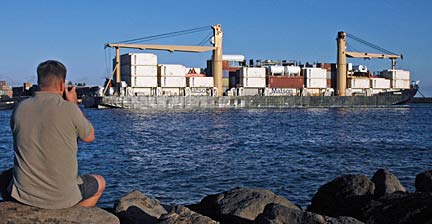
|
Harbor rules hit
small shops
Increased security regulations
at state harbors mean a
longer wait for goods
Thoai Nguyen would rather endure five-hour flights to California each month than wait weeks for the latest styles to arrive from the mainland to dress the hangers in her newly opened boutique in Honolulu.
"If you wait for the boat, it takes too long," said Nguyen, 31, founder and owner of crazybeautiful. "It takes like two weeks."
Increased security regulations at the state's commercial harbors have slowly come into effect over the past year, delaying operations and holding up shipments. Small-business owners -- whose livelihoods depend on getting merchandise from the mainland, Asia and beyond -- have had to rely on their imaginations to overcome delays.
At Executive Chef at Ward Warehouse, small kitchen items like garlic presses and utensils come in via airmail, while bulkier cooking items like cookware and small appliances are shipped in, said Kelli Furushima, the company's buyer and general manager.
"It does seem like maybe things are taking longer," Furushima said.
The new laws, part of the federal Maritime Transportation Security Act of 2002, require harbor users to carry identification cards and be able to spot and report suspicious activities, among other things.
The U.S. Coast Guard began to fully enforce the new rules on Dec. 31 after companies were given some grace period to adjust, said Lt. Cmdr. Todd Offutt.
In its ongoing effort to protect harbors against a possible attack, the Coast Guard will conduct an exercise at Honolulu Harbor next month to mimic a terrorist attack, said Ed Teixeira, vice director of state Civil Defense.
Truck drivers transporting goods in and out of harbors also are being trained, said Gareth Sakakida, general manager of the Hawaii Transportation Association, which represents local trucking companies. "We are all learning a lot," Sakakida said.
There have only been a few terrorism scares at Hawaii harbors since the facilities began receiving more attention following the Sept. 11, 2001, terrorist attacks. The most significant alarm, a bomb threat aboard a cruise ship in 2003, turned out to be a hoax.
However, state authorities have justified the increased protection because of the harbors' economic importance to a state that imports nearly all it consumes.
Matson Navigation Co., whose cargo ships pack everything from perishables such as milk to ink barrels and automobiles, became fully compliant with the new rules after adjusting its operations last year, said Jeff Hull, the company's spokesman in Oakland, Calif.
Matson has received $965,000 from three federal grants to train hundreds of employees and other workers who enter their Honolulu piers, including vendors and contractors, said Gary Moniz, the company's facilities and security officer.
"There's a learning curve," Moniz said. "It's a major cultural change."
At Young Brothers Ltd., security costs have more than doubled to $1 million since regulations took effect last year, said Bruce McEwan, a security officer at the shipping company.
"We had anticipated it this year, but we are still running a little bit over budget," McEwan said, acknowledging that the rules have slowed traffic into the pier. "We need to ensure all employees are trained with maritime security."
But the constantly changing security requirements could put a strain on smaller business unaware of the laws, said Ted Liu, director of the state Department of Business, Economic Development and Tourism.
"Small businesses are particularly challenged because they don't have the resources. If you are Wal-Mart, you know you can dedicate a whole bunch of resources," Liu said.
Nguyen, who runs the 2-month-old boutique with a friend at Restaurant Row, said she works in an industry guided by fashion, where waiting for assistance could throw off the store's display of what is in style.
"People want their clothes now," Nguyen said. "You know how girls are."
So Nguyen crosses the Pacific every month to Los Angeles for aggressive shopping sprees at wholesalers, then brings back the goods in overstuffed bags.
"I get charged for overweight," she said with a laugh, reluctantly admitting to a 30-box record on a single trip. "But ... I can keep my own schedule, and I love shopping so it doesn't bother me."
E-mail to City Desk
[News] [Business] [Features] [Sports] [Editorial] [Do It Electric!]
[Classified Ads] [Search] [Subscribe] [Info] [Letter to Editor]
[Feedback]
